Volunteer Caroline Wessel ALCM introduces our first Music staff
From the very start of the University College, music played an important part in its curriculum, as shown by an entry in the Annual Report of 1921/2:
During the autumn term a Department of Music was officially established, Dr Malcolm Sargent being appointed lecturer. The equipment of this Department was due to handsome gifts of pianos from Messrs W.H. Russell & Sons, Sir Herbert Marshall & Sons, and of money from Dr and Mrs E. Lewis Lilley. In the course of the spring term, Dr Sargent gave a course of lectures open to the public on “The Appreciation of Music”, which was very successful.
Leicester, Leicestershire and Rutland College Report and Accounts 1921/22, ULA/P/AR/1
Clearly the presentation of two fine grand pianos inspired the further development of the Music Department, especially as the two donors were significant local music personalities. Sir Herbert Marshall, a prominent citizen and Mayor of Leicester in 1897, owned a flourishing music business he had started in 1875. His business rival was piano shop owner William Russell, who in 1922 founded the Leicester Symphony Orchestra, and whose son, Karl, was the driving force behind its expansion and success. Always in competition with Marshall, it was a triumph when Russell managed to engage Dr Malcolm Sargent as the LSO’s first conductor.
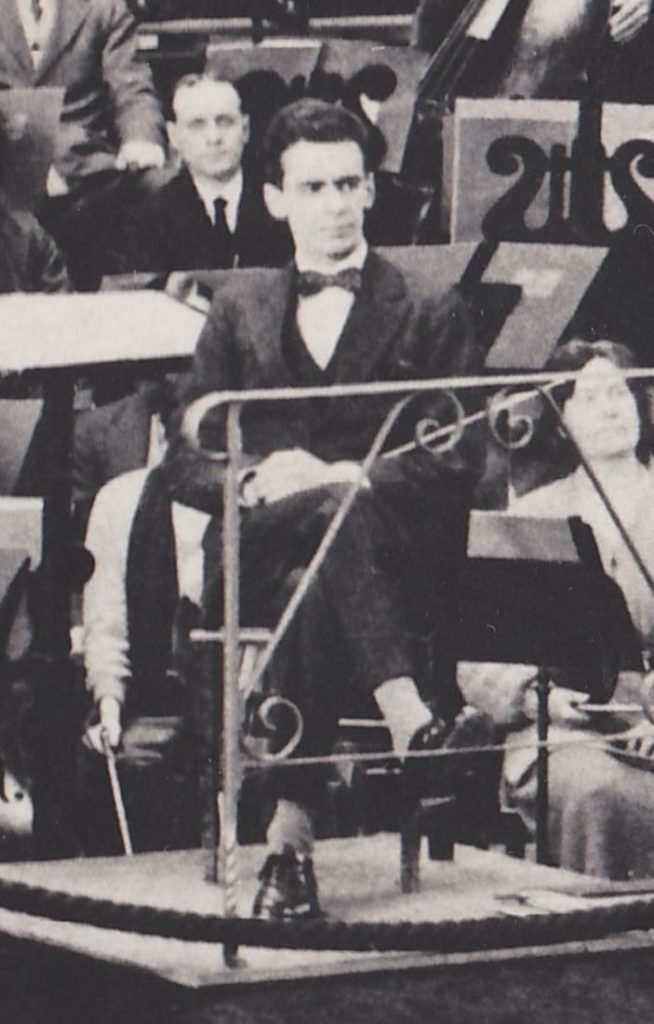
At that time the brilliantly talented Dr Sargent (1895-1967) was organist at St Mary’s church, Melton Mowbray, but in 1921, the year he became the University’s first music lecturer, he was invited by Sir Henry Wood to conduct his own work at Leicester’s De Montfort Hall. Wood was so impressed that he asked the young man to conduct a London Prom concert and as a result during the 1920s Malcolm turned from composition to conducting and became one of the best known and well loved English conductors of his time. However the College’s Annual Report of 1924 stated that ‘Dr. Malcolm Sargent resigned the Lectureship in Music and in his stead Mr. E. Markham Lee, M.A., Mus.D., has been installed’. The previous year, at Henry Wood’s instigation, Sargent was appointed lecturer at London’s Royal College of Music and his conducting career rapidly escalated with engagements with the National Opera, D’Oyly Carte Opera and the Ballets Russes – no wonder that he had to resign at Leicester. However his replacement, Mr Markham Lee, possessed just the right qualifications and interest in young people to run the University’s burgeoning Music Department.
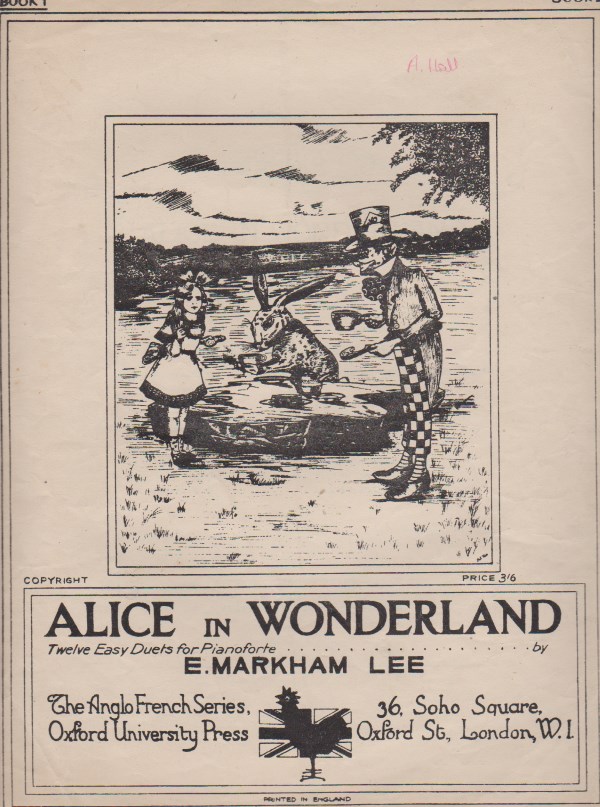
Ernest Markham Lee (1874-1956) was an organist, composer and music examiner whose main career was in musical education. An organ scholar when at Cambridge, he became Professor of Organ at the Guildhall School of Music and was a lecturer at the Universities of Cambridge, Oxford and London, as well as Leicester. His many compositions tended to be aimed at young people and amateurs and, as an examiner for the Associated Board of Music, he travelled all over the Commonwealth and every year produced an analysis of the AB piano pieces as a teaching aid. In 1927, the year he left the Leicester Music Department, he was appointed President of the Incorporated Society of Musicians.
The Annual Report of 1925 records that
In the department of music additional teachers were appointed in the persons of Mr. B. Burrows, Mus.D., Miss Grace Burrows, A.R.C.M., Mrs. Ruby L. Robertson, L.R.A.M, and Mr. Vincent Dearden, A.R.C.M.
Leicester, Leicestershire and Rutland College Report and Accounts 1924/25, ULA/P/AR/4

The Burrows siblings, Ben and Grace, born of musical parents, were extremely active and talented musicians and their teaching must have greatly enhanced the Music Department. Dr Ben Burrows (1891-1966) was a superb organist and prolific composer, and his music theory teaching was considered the best in the country. Passing the Associate and Fellowship exams of the Royal College of Music within one year, he could compose with prodigious speed and fluency (apparently writing a new psalm chant in the time it took the organ bellows to empty!). However he was a shy, reticent man, shunning public recognition, though his wry sense of humour endeared him to his friends. He composed many solo songs as well as pieces for piano and orchestra and founded his own publishing company, Bodnant Press. A catalogue of his manuscripts and printed work given to the University of Leicester in 1980 and 1996 amounts to 93 pages (ULA/MS 132). Ben was also a horologist and precision engineer, inventing a typewriter that could print music, and he loved microscopy and painting. At the University Dr Burrows taught organ, harmony and counterpoint, aural and musical appreciation from 1924 up until the time of WW2.
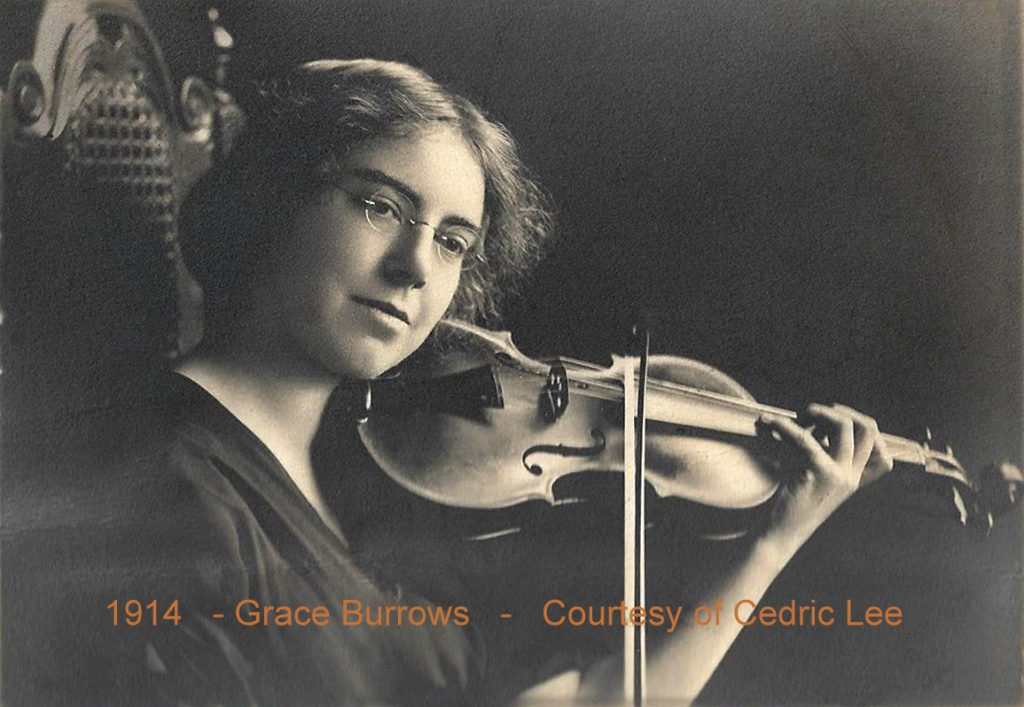
Grace Burrows (1893-1981) was already by the age of 20 regarded as the best violinist in Leicester and became Leader of the De Montfort Orchestra, the premier one in town. She played with it for 10 years as well as giving solo concerts or performing with her brother on organ, and formed her own Music School which led to her high-quality Pupils’ Orchestra. In 1920 Grace was also playing Viola in the Birmingham String Quartet, but in 1921/2 she played a significant role in the formation of Ken Russell’s embryo Leicester Symphony Orchestra, auditioning its string players, conducting rehearsals, and working with its conductor, Malcolm Sargent. She led the LSO in every concert until 1939 and on one occasion replaced Sargent on the rostrum while he played a Mozart Piano Concerto. As a part-time lecturer at the University College, Grace gave violin lessons and ran orchestra practice and string ensembles.
On March 28 1926 the Leicester Mail reported that,
The Music Advisory Committee recommended that under Dr E. Markham Lee, as Head of the Department of Music, Mr S. James Ching BA, Music D. of Leicester be appointed tutor for piano in succession to Dr Markham Lee and, jointly with Dr Burrows recognised for teaching the theory of music in the department. They further recommended that Mr Ching be asked to allow his name to go forward as Lecturer in Music in the Faculty of Arts, music now being recognised as a subject for all stages of the London Arts Examination up to Pass.
Leicester Mail, 28 March 1926
The report was approved and these appointments clearly paid off because in September 1926 the Leicester Mail reported that ‘one of the most flourishing sections of the University is the Music Department under Dr Markham Lee, and a gratifying music result …’.
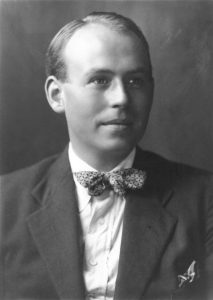
James Ching (1900-1962), a child prodigy, came to live in Leicester when his father was appointed Postmaster General there and his mother started a Music School in the town. At the age of three James was found to have perfect pitch; aged seven he played the piano to Sir Henry Wood, who immediately recommended him to the Junior Department of the Royal Academy of Music; and when only eight performed at London’s Wigmore Hall. When he was seventeen Ching gained an open organ scholarship to the Royal College of Music, where he studied composition with Sir Charles Stanford, choir training under Sir Walford Davies, and conducting with Sir Adrian Boult, and before his eighteenth birthday had passed both the ARCO and FRCO exams – the youngest student to do this at that time.
The year before he was appointed to the Music Department Ching gave three very successful recitals at the Wigmore Hall, excelling in particular with his playing of Bach. 1926 saw the start of his many years of BBC radio recitals. In 1927 he performed Bach’s music live on air daily for a week and also played regularly for the evening broadcasts of a Foundation of Music Series. At this time he was also publishing his own piano compositions and writing instructive manuals for piano students. In 1927/28 he and the ‘clever pupils’ of his Leicester School of Music gave several warmly received recitals at the Edward Wood Hall (now Fraser Noble Hall). According to the Leicester Mail ‘to conclude the concert Brahms E Flat Rhapsody was in the hands of James Ching a thing of beauty. It had point and meaning impossible to miss’, while another critic wrote ‘of Mr Ching’s playing it need only be said that he made Schumann sing as only the very best players are able. There was real poetry and imagination as well as a subtly beautiful tone in his playing’. From 1927-31 James excelled every year with his solo performance of a piano concerto at a prestigious Henry Wood London Promenade concert with further Prom appearances up until 1945.
By now the University College’s Music Department was thriving – but unfortunately it was not self-funding. For the Leicester Mail wrote in October 1926 that ‘Subscriptions of £5 each on the loss of the Music Department were received from Mr E. Gorham Gee, Mrs W.E. Tyler and Major L.V. Wykes’ and it was relying on its benefactors for assistance.
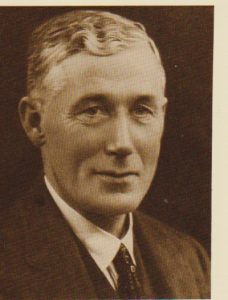
Ernest Gorham Gee (1871-1941) was one of those who came to its help. He was the eldest son of early benefactor, H. Simpson Gee, brother to Percy Gee and himself a talented composer and pianist. The conservatory at Ernest’s home on Granville Road was his music room where there were two grand pianos, on which eight-handed music would be played for dancing at the family’s social events. In 1920 Ernest was a founder member of the Leicester Competitive Music Festival, its chief organiser and Treasurer, and at Festival time Granville House was ‘open house’ for the adjudicators who included Malcolm Sargent and Markham Lee. Ernest had a great love of young people, encouraging them and sometimes paying for their music tuition. He was also a founder, committee member and first Treasurer of Leicester Bach Choir and on occasions would pay a soloist’s fees when funds were insufficient. Ernest served on the University College’s Music Advisory Committee and supported it in various other ways.
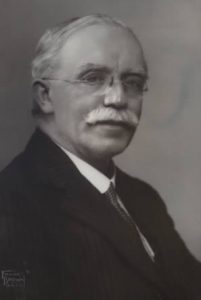
The 1926 Accounts confirmed this financial loss and Dr Lilley was one of those who also donated £5 to cover it – for he had shown generosity to the Music Department as early as 1921. Dr Ernest Lewis Lilley (1877-1948) was a Leicester surgeon, prominent at the town’s new Maternity Hospital. During the First World War he was First Surgeon at the Military Hospital that became the University campus, working there with Dr Astley Clarke on the early use of X-ray. A noted musician, he was organist of Leicester’s Unitarian Great Meeting for more than forty years and played the organ in many English cathedrals and churches. Dr Lilley was an early member of the University College Council and Court of Governors, served on its Music Department Advisory Committee, and gave funds to its Music Library.
The Annual Report for 1927 stated that ‘the reorganization of the Department of Music was a marked success, as the increase in students shows. So successful was it that Dr. Markham Lee felt that his services, secured for the initial stages of the scheme, could now be dispensed with and he left at the end of the session with the sincere appreciation of the College for his services. The Board would record its sense of the generosity of the gift of an excellent gramophone to the department by Godfrey de Solla, Esq.’- listed elsewhere as a ‘modern HMV cabinet gramophone’. De Solla came from a prominent Leicester Jewish family and ran a thriving music and gramophone record shop on London Road, that boasted having ‘Every Columbia Record in Stock’.
In 1929 ‘The Department of Music has lost by death its lecturer on vocal music, Mr. Vincent Dearden. The Committee would record its sense of the value of his services to the College. This lectureship has been filled by the appointment of Dr. Slater, Organist and Master of the Choir, Leicester Cathedral’. Dr Ernest Slater (1896-1979) was a composer of organ, piano, choral music and several well known hymn tunes. He was also the dynamic founder of Leicester Bach Choir, along with Ernest Gee, Dr Lilley, Major Wykes and Dr Rattray (Principal of the College). In 1930 the Academic Committee noted that ‘a very pleasing feature is the enthusiasm of the Choral Class under Dr Slater, whose forty members insisted on continuing their work throughout the summer term’. Dr Slater was organist at Leicester Cathedral from 1927 to 1931 and then moved to Lincoln Cathedral.
The Leicester Music Department formally closed in the early 1970s, so a BA in Music was no longer available. Some musical activities were transferred to what is now the University’s Attenborough Arts Centre, but this ceased in 2006. However in 2020 the University still has a number of music societies – an orchestra, two bands, two choirs and there are three music scholarships. In addition the internationally renowned Philharmonia Orchestra has a partnership with the University, and can provide instrumental, conducting and composition tuition. But those brilliant musicians who set the Music Department alight with their energy and fervour in the 1920s must surely be remembered for the joy they gave to so many young musicians.
Many thanks to Mrs Mary Bonnin for information on her father, James Ching, for permission to use her photograph of him, and for her friendly e-mail correspondence
Key Sources
University of Leicester Archives, Annual Reports, ULA/P/AR
Pressing Cuttings Books, ULA/PCB
Leicester Symphony Orchestra website
Leicester Lit & Phil website, Presidents
Kelly’s Directory of Leics & Rutland (1912) pp. 246, 346
Wessel, Caroline, Introduction to Three Preludes for Piano by E.G. Gee
Whittaker, Mary History of Leicester Bach Choir